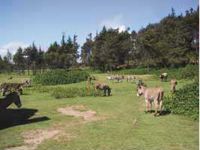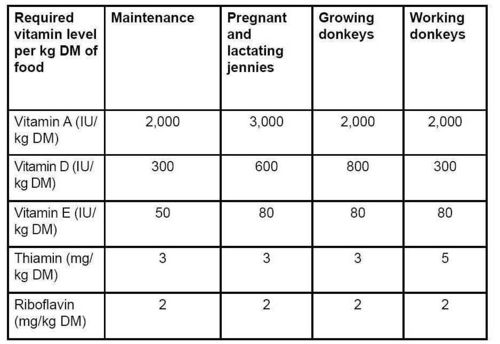Vitamin Requirements - Donkey

Vitamins are a diverse group of organic nutrients of which animals require in small quantities to remain in good health. They have an extremely wide role in the body: some are antioxidants, others are co-enzymes or hormones.
There are two types of vitamin: fat-soluble vitamins and water-soluble vitamins. Fat-soluble vitamins (vitamins A, D, E and K) can be stored by the body and deficiency symptoms tend to develop slowly after a long period of deprivation. When fat-soluble vitamins are over-supplied for a very long period, toxicity may develop. In contrast water-soluble vitamins (vitamins B1, B6 and B12 ) cannot be stored by the body and deficiencies develop rapidly.
Vitamins are very abundant in green forage; pasture-fed donkeys or those fed fresh forage are highly unlikely to suffer from vitamin deficiency. Young or geriatric animals may be vulnerable, particularly when intake of green forage is restricted. The levels of vitamins in conserved forage and manufactured feeds are generally quite low and diminish as storage time increases. Animals that are fed conserved forages/feedstuffs are most at risk from vitamin deficiency, particularly towards the end of the winter when vitamin levels in dried forage are lowest. Allowing donkeys some time to graze during the winter is very beneficial for their vitamin intake. Vitamin allowances for donkeys are shown in the table below.

In certain circumstances an acute vitamin deficiency can arise. Bracken contains an enzyme called thiaminase that destroys vitamin B1. Donkeys that have eaten large quantities of bracken may exhibit acute neurological symptoms (circling movements, head pressing, blindness and muscular tremors) due to acute vitamin B1 deficiency. Thiaminase is also present in raw fish, so fishmeal should always be cooked before it is fed to donkeys (or avoided where possible).
The best way to provide donkeys with sufficient vitamins is to give them access to fresh green forage; even a small quantity will help stave off deficiency. If supplements are fed, they should be provided in a form that does not provide additional energy to the donkey. Proprietary vitamin and mineral mixes are relatively expensive on a cost per kilogram basis but are required only in small quantities, hence they are more cost-effective than they initially appear.
Biotin, also known as vitamin H or B7 is often included in vitamin mixes and balancers in order to improve hoof health. Biotin can be both consumed and synthesized by bacteria in the large intestine. There have been no trials on biotin requirements in donkeys, but it has been suggested that supplying the recommended level for horses will ensure adequate supply for donkeys. Extrapolating from equine studies is the best we can do for many vitamin and mineral requirements as work is highly unlikely to be funded in the donkey.
If supplements are fed, they should be provided in a form that does not provide additional energy to the donkey. Proprietary vitamin and mineral mixes are relatively expensive on a cost per kilogram basis but are required only in small quantities, hence they are more cost-effective than they initially appear. The Donkey Sanctuary has found using TopSpec Donkey Forage Balancer to be very useful in preventing deficiencies in the majority of healthy adult donkeys.
Special need cases
Donkeys that are growing, lactating, ill or elderly will benefit from a higher specification vitamin and mineral supplement to ensure that all their needs are being met at a nutritionally demanding time.
References
- Smith, D. and Wood, S. (2008) Donkey nutrition In Svendsen, E.D., Duncan, J. and Hadrill, D. (2008) The Professional Handbook of the Donkey, 4th edition, Whittet Books, Chapter 1
- McDonald, P., Edward, R.A., Greenhalgh, J.F.D., and Morgan, C.A. (2002). Animal Nutrition (6th Edition). Prentice Hall, Harrow.
|
|
This section was sponsored and content provided by THE DONKEY SANCTUARY |
|---|